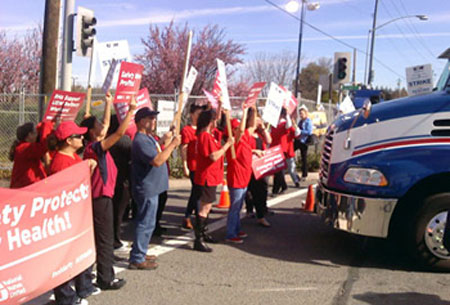TEXAS CITY, Texas — The strike by 5,200 oil workers is gaining support as it enters its third week. Members of the United Steelworkers union at 11 refineries in Texas, California, Indiana, Kentucky, Ohio and Washington are walking the picket lines around the clock, making this the first nationwide oil strike since 1980. The Steelworkers represent some 30,000 workers throughout the oil industry, including at 65 plants that produce nearly two-thirds of refined petroleum in the country.
The refineries on strike account for 13 percent of national production and are mostly being operated by management and strikebreaking contractors. Those not on strike are operating on day-by-day contract extensions.
“We’re not fighting for money, we’re fighting for safer working conditions,” said Phil Harris when he stopped by the union hall after picket duty at the Marathon refinery here Feb. 15. Three oil refineries and two related facilities are on strike in the Houston area “not just to protect the workers but the communities,” he said.
“People do die on this job,” Warren Kostenuk, a worker in the alkylation unit at Tesoro in Martinez, California, told the Militant. Seven died in a 2010 leak and fire at the Tesoro refinery in Anacortes, Washington. “Four more died and one was critically injured right here in 1999,” he said. “We put our lives on the line every day. Safety has to be the top priority.”
Fatigue is the central issue, many of the strikers said, because they are forced to work 12-hour shifts for extended periods with few days off.
Shell Oil bosses see it differently. “One of the issues on the table is the company’s fundamental rights to staff operations according to business needs,” Shell Deer Park Site General Manager Barry Klein said in a company statement Feb. 7.
In Anacortes, Washington, management at Tesoro sent a letter Feb. 3 to Steelworkers attacking their union for going on strike.
James Tangaro, company vice president at the refinery, ticks off all the things striking workers will lose. “All pay will cease,” he says, as well as health insurance, life insurance, disability, retirement and all company scholarships for workers’ children.
He says they can get health care on COBRA for $1,772 a month.
Tami Straub, a picket captain in Anacortes, showed a tattoo on her arm with seven stars for the five men and two women killed in the 2010 explosion there. “This was the crew that relieved me when I went home that day,” she said. “A lot of us have tattoos in memory of those workers.”
Solidarity grows
Solidarity for the strike is growing. After learning about the walkout, Boo Breland and Chris Vetra, both of whom work at Chevron’s Oronite chemical plant near New Orleans, hopped in a car and drove to the picket line at the Marathon refinery here Feb. 14.“I want them to know that when they are looking over their shoulder for who is backing them up, here I am,” Breland said. On the way they stopped in Gonzalez, Louisiana, where BASF chemical workers contributed a trailer load of canned goods. At the Texas City union hall they cooked a couple giant pots of jambalaya, a spicy Cajun rice, meat and a seafood dish for the strikers.
“I believe the industry looked at this workforce and thought now is the time to test the mettle of the new employees,” W.E. Sanders, Subdistrict Director for Steelworkers District 13, told the Militant. While Texas is a “right to work” state, where workers in a union-organized plant can choose not to join the union, only 11 of the 1,100 oil workers at Marathon aren’t union members, he said.
At ECO Services, a sulfuric acid-making plant where many employees are in their mid-20s, the Steelworkers have 100 percent membership, Steve Ballesteros, president of USW Local 227 in Pasadena, told the Houston Chronicle Feb. 6. Half of those 80 ECO workers rallied on behalf of the striking Steelworkers and barbecued for those on the picket lines.
Steelworkers Local 7-1 in Whiting, Indiana, was a center of activity Feb. 14. Union signs left by workers who had joined the pickets lined the walls. There were shelves stocked with supplies and long tables full of hot food, coffee and pastries for strikers waiting for a ride to picket duty at one of the 12 gates at the BP Whiting refinery, the third largest in the U.S. Supporters bring truckloads of wood every day to burn in steel drums to keep pickets warm.
“We received tons of support the first week of the strike,” Dave Danko, Local 7-1 president told the Militant. “Northwest Indiana and Greater Chicago is a strong union area. Teachers, nurses, autoworkers and USW locals from the steel mills have come to the picket lines. Community people come by the union hall and picket lines and bring food and cash.”
Members of Steelworkers Local 5 in Martinez, California, got a boost when two dozen nurses, members of the California Nurses Association, joined the picket lines at the Tesoro refinery Feb. 12.
“Worker Safety Protects Community Health!” read the banner the nurses carried.
After a two-day strike in November, union nurses won a contract requiring bosses to hire more nurses to lessen chronic understaffing and better preparation to protect nurses and patients in treating Ebola and other infectious diseases.
“Nurses are here today because so many of the conditions the Steelworkers are facing are the same the nurses are facing,” Katy Roemer, a nurse at Kaiser Permanente in Oakland, said at an impromptu rally at the gate. “They need the ability to shut down production when they identify health and safety risks.”
Jerry Freiwirth and Betsey Stone in Martinez, California, John Naubert in Anacortes, Washington, and Anne Parker in Whiting, Indiana, contributed to this article.
Related articles:
Oil train derails, explodes, fouling river in WVa
West Coast dock bosses lock out port workers, attack union
On the Picket Line
Facing gov’t threats, Canadian railworkers end strike
Conferences in March to discuss fight for rail safety
No gov’t intervention in labor battles!
|
Printer-friendly version of this article |















